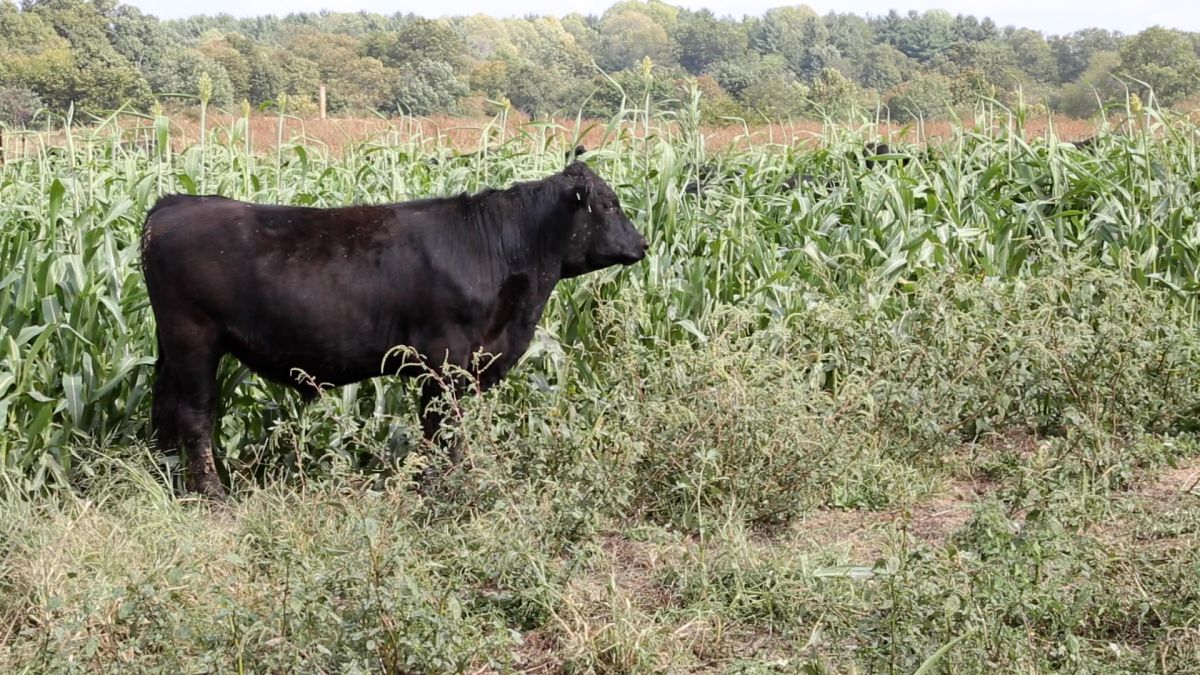
Fischer Farms products can be found in stores all around the state including Bloomington, Indianapolis, South Bend and more.
Devan Ridgway - WFIU/WTIUFischer Farms in Saint Anthony, Indiana, has seen a lot of operational changes since its inception during the Civil War.
The farm, owned and operated by Joseph Fischer and family for six generations, decided in 2004 to switch from conventional beef production to a process requiring fewer antibiotics.
“We wanted to raise top quality beef,” he said. “We want our beef to consistently be considered one of the best beef around. But then we also wanted to raise it in a way where our family was comfortable eating it, we wanted to do it by raising it without growth hormones, without antibiotics.”
From there, they began to use regenerative ag processes such as installing ponds that naturally filter and conserve the farm’s water supply, capturing excess carbon by using no-till methods and planting vegetation year-round, and even reducing cows’ methane production by feeding them kelp.
“By a relatively small investment in feeding our cattle kelp, we can reduce their emissions by 82 percent, it's a no-brainer,” he said.

The efforts are having results. An independent team out of Bloomington has been conducting soil tests on the property to complete a lifecycle analysis of the impacts.
“We've shown topsoil increases from three inches to as much as 16 inches through this rotation,” he said. “And when you think of topsoil, that's organic matter, that's carbon dioxide that was in the air that is now permanently stored in the ground.”
The Fischers have recently been in contact with the Antibiotic Resistance Action Center at George Washington University.
The group has been gathering information and data on Fischer’s efforts to lessen the use of antibiotics in their cattle.
Antibiotic Resistance Action Center representative Kathy Lawrence said Fischer Farms will be the first adopters in the nation of their Certified Responsible Antibiotic Use, or CRAU, Standard for beef.
“We created the CRAU standard to give producers an opportunity to change their antibiotic use practices to be more responsible and to use them less frequently, and also to have the legitimacy of a standard that was created and is owned by a nonprofit institution and that is certified by a government agency that does not have a profit motive,” she said.
Through this process verification, the farm will be checked twice a year by USDA auditors to ensure that everything measures up.
Lawrence said CRAU was developed in 2014 for poultry, and the process was adopted by Tyson a year later. Their goal is to raise the floor on antibiotic use in animal agriculture across the country.
“Right now, it's kind of the Wild West still in terms of the beef industry, because you've got basically conventional production with very little information, and very little accountability for how and when antibiotics are used,” she said.

The Antibiotic Resistance Action Center said the standard aims to create a sort of middle ground in the beef industry. On the cheaper, more available end, some producers overuse antibiotics to make up for unsanitary and overcrowded living conditions. Alternatively, purely organic and antibiotic-free beef is in low supply and often comes at a higher cost to consumers.
Under the CRAU standard, farmers can give antibiotics to their cattle if they get sick, but their use will be closely monitored.
“We need antibiotics when we as humans are sick, we need antibiotics when animals are sick,” she said. “But we are not going to build an entire industry around the daily overuse and misuse of antibiotics that feeds antibiotic resistance.”
According to Paul Ebner, interim director for the Department of Animal Sciences at Purdue University, process verification standards like this aren’t uncommon. Many organic labels on meat products originate similarly, where an independent third party creates the standard and companies can choose whether to adhere to them, depending on the product they’re marketing.
“What this third party will generally do is basically do the audit and say, yes, these things are all happening, they are doing things as they stated, and they're verifying that process,” he said. “It's not going to tell you that this product is better or higher quality or safer. That's up to the consumer.”
While Ebner wasn’t aware of the CRAU standard becoming available to beef, he did say that consumer demand is there.
“It's part of this whole idea of we want to preserve the efficacy of antibiotics, so let's use them as sparingly as possible,” he said. “For some consumers, they want to see that in their product, so they look for those labels.”
If the CRAU standard for beef develops as the one for poultry did, Fischer Farms could be the first in the nation to adhere to a widely used system for marking beef products as responsibly treated with antibiotics.
“That's something that we really tried to stand by is that we don't make you pick between the different benefits,” Joseph Fischer said. “We don't make you pick sustainable beef that doesn't taste good. We want a top-quality steak that you can feel good about eating.”
While Fischer Farms currently adheres to CRAU standards, it won’t become the first official adopter of the verification until the USDA does its official audit this spring.
 DONATE
DONATE






 Support WFYI. We can't do it without you.
Support WFYI. We can't do it without you.